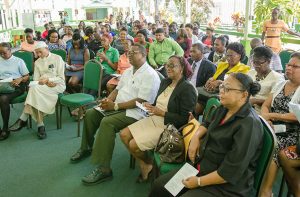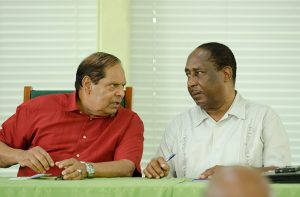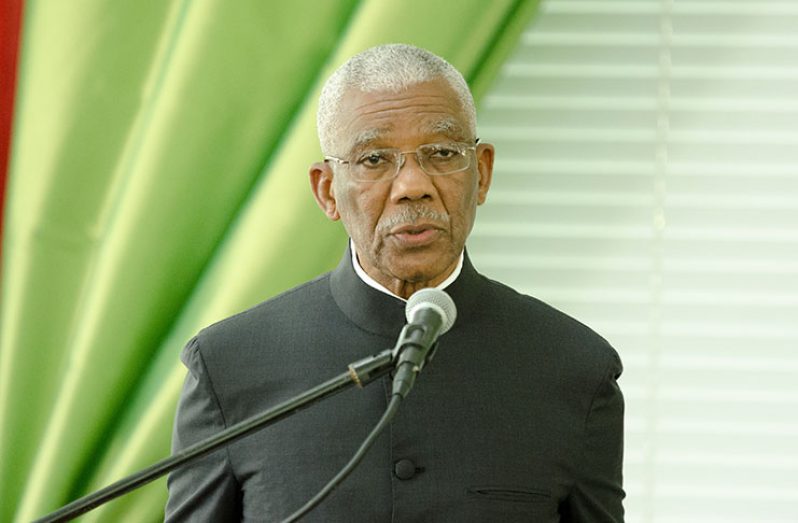…President tells GPSU confab
this ever-evolving world, it is necessary to adapt to changes, President David Granger said, as he delivered the keynote address at the Guyana Public Service Union’s (GPSU) 23rd Biennial Delegates Conference on Wednesday. He warned that failure to adapt could result in redundancy.
Change, he noted, is taking place at a rapid pace, thereby transforming the nature of the workplace. “Workers who are not prepared for the continuous changes in the field and office could find their careers retarded and their service redundant,” he stated.
In an effort to adapt to the changes within the work environment, workers, he said, must undergo constant training. “Education is essential to preparing employees to enter the labour market and once in the labour market, to adapt continuously to the changing nature of work. It means that education must be continuous,” the Head of State told the delegates seated beneath the Baridi Benab at State House.
Sitting among the delegates were Prime Minister, Moses Nagamootoo; Speaker of the National Assembly, Dr. Barton Scotland; GPSU President, Patrick Yarde, and the Guyana Trade Union Congress (GTUC) General-Secretary, Lincoln Lewis among other officials and trade unionists.
In further underscoring the importance of adapting to changes, particularly in the area of technology, President Granger said a modern public service demands competent, proficient and versatile workers who can adjust to the changes within their fields.
“The public service has created jobs for highly-skilled persons but it has also displaced low-skilled employees. The conclusion is obvious, to survive, employees have to become more highly-skilled even after they have commenced their service,” he reasoned.

Photos by Delano Williams
As in other parts of the world, and Guyana, the public service provides administrative services to citizens, communities and companies throughout the country. These include registration, agricultural, immigration, health, postal, legal and local government services. In the public education, public health, public infrastructure, public telecommunication, public security and social security sectors, public servants also offer critical services.
He told the delegates and officials present that if the lives of citizens are to be improved, and an enabling environment for businesses is to be created, the Public Service must adapt to technological and other changes through education. A corps of highly-trained and competent public servants, he added, is essential to ensuring the delivery of quality and timely public services.
Here in Guyana, the public service has changed since “those slow, sluggish days,” according to the President. “It has become a more complex network of agencies, departments and ministries offering a variety of services to wider urban, rural, hinterland and even international communities in terms of the Foreign Service. It has also become more competitive and the people, who acquire new skills and can perform better than their colleagues, will move further, faster,” he pointed out.
When the A Partnership for National Unity + Alliance For Change (APNU+AFC) Government took office in 2015, the situation was less than desirable, he said. Due to the fact that many school leavers were unable to perform effectively within the public service, the APNU+AFC Government established the Bertram Collins College of the Public Service. At the Bertram Collins College, public servants are being equipped the requisite skills and knowledge needed to effectively engage in public administration. “The College is overcoming its early teething problems and is working to enhance the competencies of cadets so that when they join their respective ministries and departments, they could deliver efficient public services,” the President noted.
He noted that government is aggressively working to provide equal and equitable service to all Guyanese regardless of their geographical location. Government’s objective, he detailed, is to reduce inequalities, including access to public services. “The creation of the capital towns in the course of time will enable the establishment of more secondary schools, better equipped, better staffed hospitals, more law courts, passport offices, police stations. Each region is going to have a divisional headquarters,” President Granger told those present.
Even as the country’s economy undergoes transformational change, the public service is being reconfigured to better regulate the economic sectors. However, the public service, in the discharge of its regulatory role, will require more specialised and highly-skilled public servants, he said.
In support of his position, President Granger alluded to the International Labour Organisation’s Global Commission on the Future of Work Report entitled ‘Work for a Brighter Future.’ In that report, the commission said the establishment of a lifelong learning ecosystem is critical so as to enable “people to acquire skills and to re-skill and up-skill.”
Turning his attention to GPSU, the President said the union has the experience and the expertise to inaugurate a new compact, agreement, concord between the government, the trade unions and the private sector. The union – one of Guyana oldest trade unions – has to lead by example, he posited.

Prime Minister Moses Nagamootoo, in delivering brief remarks, said public servants are now being paid better wages and salaries in better working conditions. “When we got into the government, although we were unable to pay the wages’ debts that we inherited because of the nature and the quality of the revenue at our disposal, you still could not be unaware and unappreciative of the fact that some of the elements of the non-wage’s package were put into force with the duty free and some house lots and allowances and the raising of the income tax threshold and the withdrawal of NIS from some levels of deductions,” the prime minister explained.
GPSU President Patrick Yarde, though acknowledging the strides made in recent years, highlighted the need to fully address the issues facing sweeper cleaners in the country. Yarde said the sweeper cleans must be treated as permanent pensioners and public servants. “The torture they endured for all these years must come to an end,” he emphasised.
Yarde said many public servants are living below the poverty line and must be afforded livable wages and salaries. He said while there is infrastructural development taking place, much more needs to be done for public servants.
Meanwhile, GTUC Representative, Vera Naughton, underscored the importance of collective bargaining. “This showcases the strength of our unions in negotiations for a living wage and better conditions of work. The realisation of this is best achieved in a democratic environment where the rights of the working class are not only respected, but continuously advanced for the betterment of society,” she said. Guyana Agricultural and General Workers’ (GAWU) Representative, Kemton Alexander also echoed similar views.












